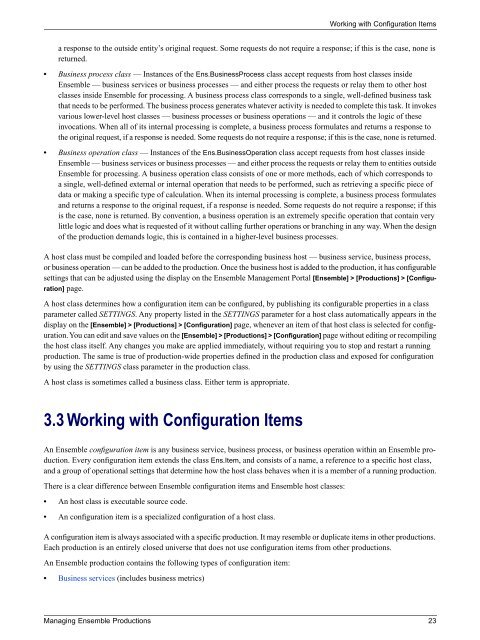Managing Ensemble Productions - InterSystems Documentation
Managing Ensemble Productions - InterSystems Documentation
Managing Ensemble Productions - InterSystems Documentation
You also want an ePaper? Increase the reach of your titles
YUMPU automatically turns print PDFs into web optimized ePapers that Google loves.
Working with Configuration Items<br />
a response to the outside entity’s original request. Some requests do not require a response; if this is the case, none is<br />
returned.<br />
• Business process class — Instances of the Ens.BusinessProcess class accept requests from host classes inside<br />
<strong>Ensemble</strong> — business services or business processes — and either process the requests or relay them to other host<br />
classes inside <strong>Ensemble</strong> for processing. A business process class corresponds to a single, well-defined business task<br />
that needs to be performed. The business process generates whatever activity is needed to complete this task. It invokes<br />
various lower-level host classes — business processes or business operations — and it controls the logic of these<br />
invocations. When all of its internal processing is complete, a business process formulates and returns a response to<br />
the original request, if a response is needed. Some requests do not require a response; if this is the case, none is returned.<br />
• Business operation class — Instances of the Ens.BusinessOperation class accept requests from host classes inside<br />
<strong>Ensemble</strong> — business services or business processes — and either process the requests or relay them to entities outside<br />
<strong>Ensemble</strong> for processing. A business operation class consists of one or more methods, each of which corresponds to<br />
a single, well-defined external or internal operation that needs to be performed, such as retrieving a specific piece of<br />
data or making a specific type of calculation. When its internal processing is complete, a business process formulates<br />
and returns a response to the original request, if a response is needed. Some requests do not require a response; if this<br />
is the case, none is returned. By convention, a business operation is an extremely specific operation that contain very<br />
little logic and does what is requested of it without calling further operations or branching in any way. When the design<br />
of the production demands logic, this is contained in a higher-level business processes.<br />
A host class must be compiled and loaded before the corresponding business host — business service, business process,<br />
or business operation — can be added to the production. Once the business host is added to the production, it has configurable<br />
settings that can be adjusted using the display on the <strong>Ensemble</strong> Management Portal [<strong>Ensemble</strong>] > [<strong>Productions</strong>] > [Configuration]<br />
page.<br />
A host class determines how a configuration item can be configured, by publishing its configurable properties in a class<br />
parameter called SETTINGS. Any property listed in the SETTINGS parameter for a host class automatically appears in the<br />
display on the [<strong>Ensemble</strong>] > [<strong>Productions</strong>] > [Configuration] page, whenever an item of that host class is selected for configuration.<br />
You can edit and save values on the [<strong>Ensemble</strong>] > [<strong>Productions</strong>] > [Configuration] page without editing or recompiling<br />
the host class itself. Any changes you make are applied immediately, without requiring you to stop and restart a running<br />
production. The same is true of production-wide properties defined in the production class and exposed for configuration<br />
by using the SETTINGS class parameter in the production class.<br />
A host class is sometimes called a business class. Either term is appropriate.<br />
3.3 Working with Configuration Items<br />
An <strong>Ensemble</strong> configuration item is any business service, business process, or business operation within an <strong>Ensemble</strong> production.<br />
Every configuration item extends the class Ens.Item, and consists of a name, a reference to a specific host class,<br />
and a group of operational settings that determine how the host class behaves when it is a member of a running production.<br />
There is a clear difference between <strong>Ensemble</strong> configuration items and <strong>Ensemble</strong> host classes:<br />
• An host class is executable source code.<br />
• An configuration item is a specialized configuration of a host class.<br />
A configuration item is always associated with a specific production. It may resemble or duplicate items in other productions.<br />
Each production is an entirely closed universe that does not use configuration items from other productions.<br />
An <strong>Ensemble</strong> production contains the following types of configuration item:<br />
• Business services (includes business metrics)<br />
<strong>Managing</strong> <strong>Ensemble</strong> <strong>Productions</strong> 23

















